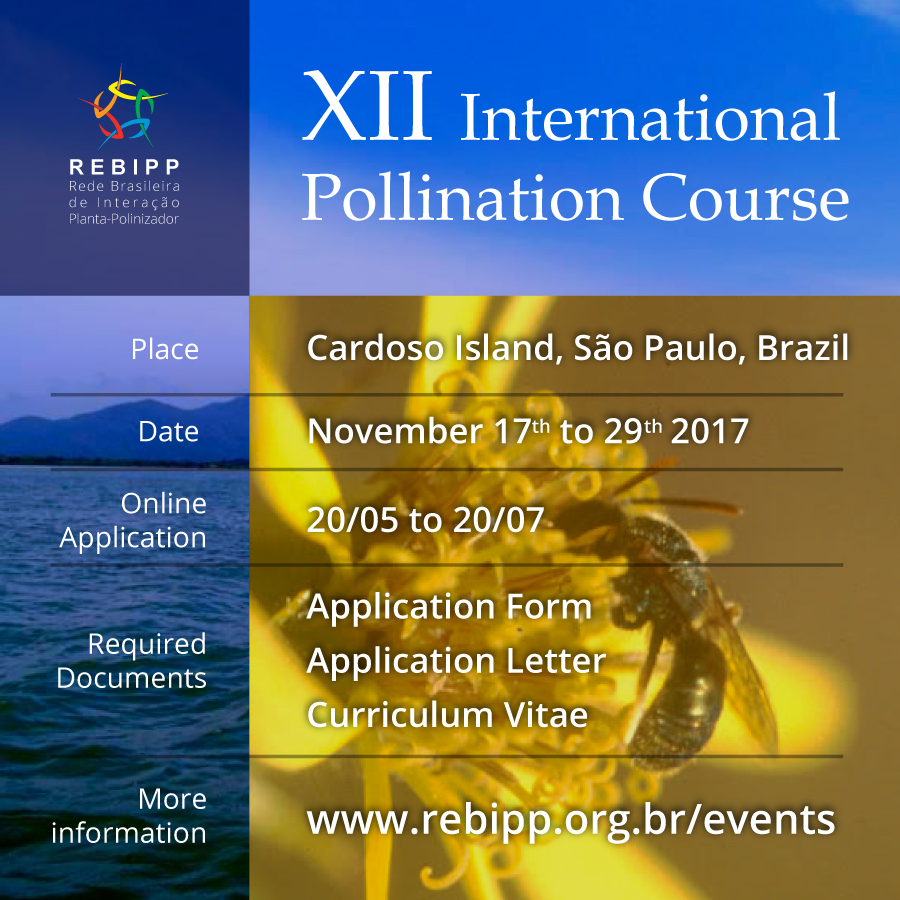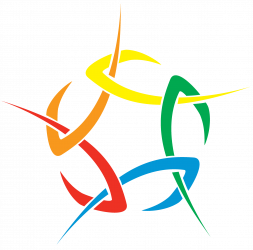November 17th to 29th 2017 – Ilha do Cardoso – São Paulo

Application Guidelines
The international pollination course is a longstanding biannual field course aimed at training graduate, advanced undergraduate and professionals, working with pollination ecology and floral biology. In 2017 the course will take place at Ilha do Cardoso in the State of São Paulo. The course is organised by a permanent core team (Kayna Agostini – UFSCar – Araras; Marina Wolowski – UNIFAL-MG; Vinicius L. G. Brito – UFU; André Rodrigo Rech – UFVJM; Patrícia Alves Ferreira – USP; Luísa G. Carvalheiro – UnB and Leandro Freitas – JBRJ) and receives National and International contributions at every edition. The main objectives of the course are to present and discuss different ecological and evolutive aspects of pollination biology, develop the student’s ability to generate novel interesting hypotheses related to the topic and to develop the skills to design experiments that allow to test such hypotheses under field conditions. Eligible applications must fulfil the following requirements:
- To be a graduate or an advanced undergraduate student or a professional working in the area of pollination ecology or floral biology;
- To fulfil the online application form (https://drive.google.com/open?id=1AjRbGLCCjUQU-reR8bcbQbDHpPO2rGWpUyz7s9h2E4s);
- To send an application letter justifying the relevance of the course for the applicant’s carrier;
- To pay the course fee (R$ 1350,00*) during the confirmation period (timetable below).
* The course fee will cover transport by boat from Cananeia to the Cardoso Island, accommodation and food during the course. In the accommodation there is no internet connection but it is possible to use the mobile phone (vivo) in some places on the Island.
Information and maps on how to get to Cananeia are available at http://www.cananet.com.br/html/comochegar.html
The application process will follow this timetable:
| Time | Step |
| 20/05 to 20/07 | Application submission |
| 30/07 | First selection list announcement |
| 01/08 to 15/09 | Course fee payment |
| 30/09 | Second selection list announcement |
| 01/10 to 30/10 | Second list course fee payment |
| 17/11 to 29/11 | XII International Pollination Course |
- Dr. Leonardo Galetto – Universidade Nacional de Córdoba – Argentina
- Dr. Mario Vallejo-Marin – Universidade de Stirling – Reino Unido
- Dr. Rodrigo Medel – Universidad de Chile – Chile
- Dr. Allan G. Ellis – Stellenbosch University – South Africa
- Dr. Cláudia Inês da Silva – University of São Paulo – Brazil
Course Program
Day 17
Meeting at Cananeia and travel by nautical transport to Cardoso Island
DAY 18
Morning
Class 1. History of Pollination Biology (André Rech)
Class 2. Flower Morphology and Function (Kayna Agostini)
Class 3. Floral Attraction (Vinicius L. G. Brito)
Class 4. Pollinator Cognitive Ecology (Vinicius L. G. Brito)
Afternoon
Class 5. Floral Rewards – Nectar (Leonardo Galetto)
Class 6. Floral Rewards – Pollen (Mario Vallejo-Marin)
Class 7. Deception in Pollination (Allan Ellis)
Class 8. Plant Reproductive Strategies (Marina Wolowski)
DAY 19
Morning
Class 9. Pollination Systems – Invertebrates (Leandro Freitas / Cláudia Inês Silva)
Class 10. Pollination Systems – Vertebrates (Kayna Agostini)
Afternoon
Class 11. Phenotypic Selection Studies in Pollination Biology (Rodrigo Medel)
Class 12. Questions and Experimental Design in Pollination Studies (Leonardo Galetto)
Class 13. Natural history of the Cardoso Island
DAY 20
Morning / Afternoon
Field/Laboratory I. Demonstration of methods (field and laboratory) for pollination studies (nectar measure, stigma receptivity, floral scent, pollen viability, breeding system experiments, floral visitors’ observation, behavior description and taxonomic identification). All Professors
Night
Talk A. Continuum of Specialization to Generalization in Pollination (André Rech)
Talk B. Pollinator Effectiveness and Floral Traits as Filters of Less Effective Floral Visitors (Allan Ellis)
DAY 21
Morning / Afternoon
Field/Laboratory II. Demonstration of methods (field and lab) for pollination studies (nectar measure, stigma receptivity, floral scent, pollen viability, breeding system experiments, floral visitors’ observation, behaviour description and taxonomic identification) – All Professors
Night
Students presentations I. Methods for Pollination Studies
DAY 22
Morning / Afternoon
Research project I. Definition of working groups and model system to develop short research projects
Night
Talk C. Pollination and Landscape Ecology (Patrícia Alves Ferreira)
Talk D. Disentangling the complexity of pollinator-mediated selection (Rodrigo Medel)
DAY 23
Morning / Afternoon
Research project II. Student supervised data collection in the field
Talk F. Nature Photography and Video: a good tool to understand natural history in pollination biology (João Paulo Krajewski)
DAY 24
Morning / Afternoon
Research project III. Student supervised data collection in the field
Night
Talk G. Data Digitalization in pollination biology (Antônio Mauro Saraiva)
Talk H. Integration of pollinators in ecological interaction networks (Luisa Carvalheiro)
DAY 25
Morning / Afternoon
Research project IV. Student supervised data collection in the field and data analyses
Night
Talk I. Crop Pollination and Economy of Pollination Services (Kayna Agostini / Cláudia Inês Silva)
Talk J. Conservation of pollinators and pollination (Luisa Carvalheiro)
DAY 26
Morning / Afternoon
Research project V. Student supervised data collection in the field and data analyses
Night
Talk K. When floral visitors turn bad: Nectar and pollen theft (Mario Vallejo-Marin)
DAY 27
Morning / Afternoon
Research project VI. Data analyses
Night
Talk L. How can genetics help to study pollination? (Mario Vallejo-Marin)
DAY 28
All day
Students presentations I. Research projects presentations
DAY 29
Travel by nautical transport to Cananeia
Further doubts, suggestions and information may be obtained from rebipp2016@gmail.com

